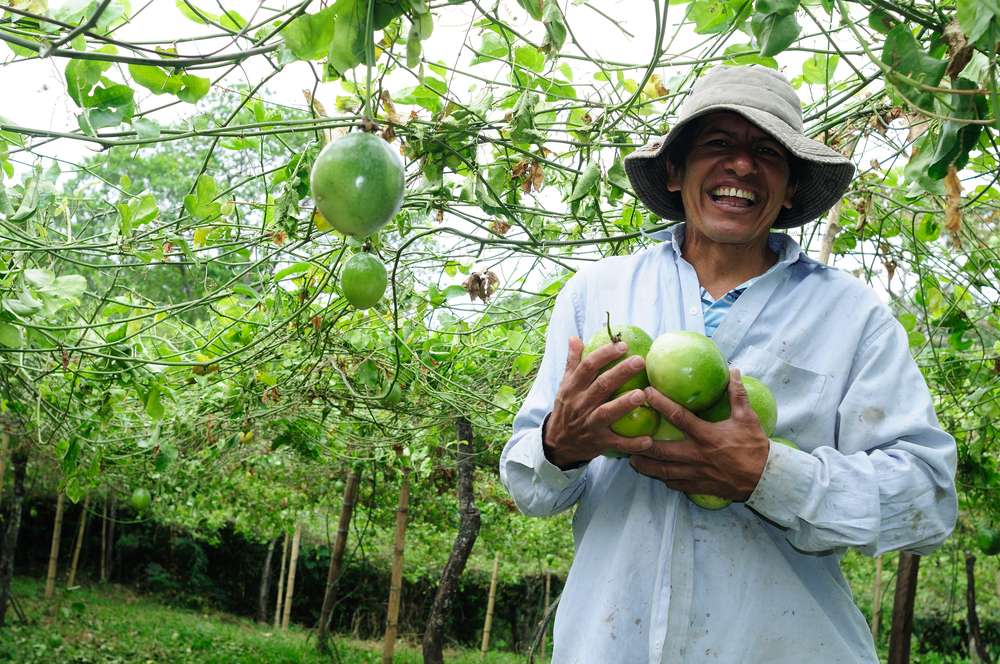The three-year project will be financed by the Standards and Trade Development Facility (STDF) and implemented by the Inter-American Institute for Cooperation on Agriculture (IICA).

San Jose, 23 February 2023 (IICA). The Standards and Trade Development Facility (STDF) and the Inter-American Institute for Cooperation on Agriculture (IICA) launched a project to promote the use of biopesticides and integrated pest control options on crops exported from Latin America and the Caribbean (LAC), with a view to improving compliance with pesticide Maximum Residue Limits and facilitating international agricultural trade.
The project—Mitigating Pesticide Residues in Latin America Using Biopesticides—will be implemented over a three-year period in Argentina, Bolivia, Colombia, Costa Rica, Dominican Republic, Ecuador, El Salvador, Guatemala, Honduras, Nicaragua, Paraguay and Peru.
An investment of more than USD 1.8 million will fund the project, which is aiming to improve product access to international markets, by mitigating chemical residues through the use of biopesticides at the end of the crop growth cycle, thereby complying with established global trade standards.
It was developed to support the establishment of a regional training center on pesticide residue and biopesticides, as well as to develop soft skills. It is also aiming to assist countries to develop harmonized regulations on biopesticides at the regional level; to generate data on residues; and to improve knowledge on how to interpret the resulting data (residue mitigation studies).
Its implementation will include the development of a regional strategy to improve the supply of phytosanitary products for minor crops and the creation of a communication program to promote the use of biopesticides among farmers.
The project was launched virtually, enjoying the participation of technical officers from the region’s phytosanitary services and from research and extension institutions in 10 of the 12 countries, in addition to representatives from private sector entities involved in the initiative and other strategic partners.
Catalina Pulido, Economic Affairs Officer of the Fund, maintained that, “This project addresses an issue that we consider to be very important: residue mitigation in order to abide by maximum limits and therefore to access international markets, which speaks to the purpose of the STDF itself”.
“Global trade and food value chains are continuously expanding, hand in hand with safety requirements for food products”, she remarked. There is also growing evidence of the speed in which pests and animal diseases can cross borders and create damage and of the negative effects of phytosanitary capacity limitations on exports, employment and economic development”.
On the other hand, Ana Marisa Cordero, Manager of IICA’s Agricultural Health, Safety and Agrifood Quality program, remarked that, “We hope to achieve the stated objectives, promoting more and better tools for our agriculture sector. We thank the STDF for selecting IICA as a strategic partner for this project, which we will develop with the countries, aiming to facilitate food trade and to generate and adopt new, modern, science-based standards”.
Project beneficiaries will include selected producers and exporters, biopesticide manufacturers, the official regulatory sector and extension institutions in the 12 participating countries”.
IICA will execute the project with the support of the Minor Use Foundation (MUF); the United States Department of Agriculture (USDA); the Interregional Research Project No. 4 (IR-4), which is the agricultural program of the USDA’s Cooperative State Research, Education and Extension Service (CSREE); the National University of Colombia (UNAL); the University of Buenos Aires (UBA) and the University of Costa Rica.
Private sector partners include CropLife, Avance Pasiflora, Bioprotección Global and the Colombian Association of Bioinputs (Asobiocol).
“This is a most ambitious project and we must work together to move it forward”, stressed Adriana Castañeda, manager of the project.
About MRLs and biopesticides
Maximum Residue Limits (MRLs) are the maximum concentrations of pesticide residue that products may contain without affecting human health. They are established by Codex Alimentarius, along with international food standards governing food safety, quality and equity in international trade.
Biopesticides of biological pesticides are inputs developed using natural materials to control pests and diseases in crops. They require regulatory frameworks and harmonized regulations at the global level.
About the STDF
The Standards and Trade Development Facility (STDF)—a global association to facilitate safe and inclusive trade—was established by the Food and Agriculture Organization of the United Nations (FAO), the World Organization for Animal Health (OIE), the World Bank Group (WBG), the World Health Organization (WHO) and the World Trade Organization (WTO), which houses and manages it.
It responds to changing needs, fosters inclusive trade, and promotes sustainable economic growth, food security and poverty reduction, thereby contributing to the United Nations Sustainable Development Goals.
More information:
Project page: https://standardsfacility.org/PG-753
Erick Bolaños, Agricultural Health Specialist, IICA.
erick.bolanos@iica.int











